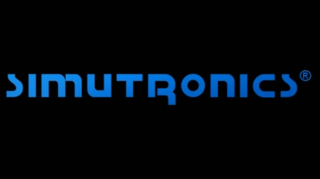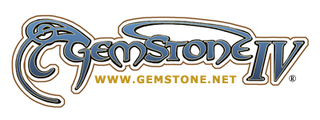Related Research Articles
LambdaMOO is an online community of the variety called a MOO. It is the oldest MOO today.
A multi-user dungeon, also known as a multi-user dimension or multi-user domain, is a multiplayer real-time virtual world, usually text-based or storyboarded. MUDs combine elements of role-playing games, hack and slash, player versus player, interactive fiction, and online chat. Players can read or view descriptions of rooms, objects, other players, and non-player characters, and perform actions in the virtual world that are typically also described. Players typically interact with each other and the world by typing commands that resemble a natural language, as well as using a character typically called an avatar.
In multiplayer online games, a MUSH is a text-based online social medium to which multiple users are connected at the same time. MUSHes are often used for online social intercourse and role-playing games, although the first forms of MUSH do not appear to be coded specifically to implement gaming activity. MUSH software was originally derived from MUDs; today's two major MUSH variants are descended from TinyMUD, which was fundamentally a social game. MUSH has forked over the years and there are now different varieties with different features, although most have strong similarities and one who is fluent in coding one variety can switch to coding for the other with only a little effort. The source code for most widely used MUSH servers is open source and available from its current maintainers.
FurryMUCK is one of the oldest and largest non-combat MUD-style games in existence. It was founded in 1990 as an online gathering place for furry fans to meet and socialize in a virtual role-playing environment. Over time, FurryMUCK has become one of the central focal points for furry fandom, with a user base consisting of several thousand, with over 150 users regularly signed on simultaneously.
AberMUD was the first popular open source MUD. It was named after the town Aberystwyth, where it was written. The first version was written in B by Alan Cox, Richard Acott, Jim Finnis, and Leon Thrane based at University of Wales, Aberystwyth for an old Honeywell mainframe and opened in 1987.

Simutronics is an American online games company whose products include GemStone IV and DragonRealms. It was founded in 1987 by David Whatley, with husband and wife Tom & Susan Zelinski. The company is located in St. Louis, Missouri. It became part of the Stillfront Group in 2016.
DikuMUD is a multiplayer text-based role-playing game, which is a type of multi-user domain (MUD). It was written in 1990 and 1991 by Sebastian Hammer, Tom Madsen, Katja Nyboe, Michael Seifert, and Hans Henrik Stærfeldt at DIKU —the department of computer science at the University of Copenhagen in Copenhagen, Denmark.

Ancient Anguish, abbreviated AA, is a fantasy-themed MUD, a text-based online role-playing game. Founded in 1991 by Balz "Zor" Meierhans and Olivier "Drake" Maquelin, it opened to the public on February 2, 1992. It is free-to-play, but has been supported by player donations since 1994.

GemStone IV is a multiplayer text-based online role-playing video game produced by Simutronics. Players control characters in a high fantasy game world named "Elanthia". The first playable version of the game was known as GemStone ][ and was launched in April 1988 on GEnie. It was one of the first MMORPGs and is one of the longest running online games still active. Access to the game is subscription-based through its website, with three additional subscriptions levels available, "Premium", "Platinum" and "Shattered", in addition to a free-to-play model introduced in early March 2015.
Player versus player (PvP) is a type of multiplayer interactive conflict within a game between human players. This is often compared to player versus environment (PvE), in which the game itself controls its players' opponents. The terms are most often used in games where both activities exist, particularly MMORPGs, MUDs, and other role-playing video games, to distinguish between gamemodes. PvP can be broadly used to describe any game, or aspect of a game, where players compete against each other. PvP is often controversial when used in role-playing games. In most cases, there are vast differences in abilities between players. PvP can even encourage experienced players to immediately attack and kill inexperienced players. PvP is often referred to as player killing in the cases of games which contain, but do not focus on, such interaction.
LPMud, abbreviated LP, is a family of multi-user dungeon (MUD) server software. Its first instance, the original LPMud game driver, was developed in 1989 by Lars Pensjö. LPMud was innovative in its separation of the MUD infrastructure into a virtual machine and a development framework written in the programming language LPC.
A persistent world or persistent state world (PSW) is a virtual world which, by the definition by Richard Bartle, "continues to exist and develop internally even when there are no people interacting with it". The first virtual worlds were text-based and often called MUDs, but the term is frequently used in relation to massively multiplayer online role-playing games (MMORPGs) and pervasive games. Examples of persistent worlds that exist in video games include Battle Dawn, EVE Online, and Realms of Trinity.

Richard Allan Bartle FBCS FRSA is a British writer, professor and game researcher in the massively multiplayer online game industry. He co-created MUD1 in 1978, and is the author of the 2003 book Designing Virtual Worlds.

The Realm Online, originally known as The Realm, is a massively multiplayer online role playing game (MMORPG) launched in December 1996 for Windows PC. It was designed in the tradition of graphical MUDs, before the usage of the terms "massively multiplayer" and "MMORPG".
A mob, short for mobile or mobile object, is a computer-controlled non-player character (NPC) in a video game such as an MMORPG or MUD. Depending on context, every and any such character in a game may be considered to be a "mob", or usage of the term may be limited to hostile NPCs and/or NPCs vulnerable to attack.
MU* is an abbreviation which refers collectively to a family of text-based multi-user virtual world servers comprising:
A MOO is a text-based online virtual reality system to which multiple users (players) are connected at the same time.

Multi-User Dungeon, or MUD, is the first MUD.

LegendMUD is a text-only MUD game founded by a group of friends including virtual world designer Raph Koster. It features historically significant story elements and award-winning gameplay. It opened publicly on February 14, 1994. It has received critical praise for its research and attention to detail in reconstructing past cultures within the game context.
A.V.A.T.A.R. MUD is a free, online, massively multiplayer, fantasy, text-based role-playing game, set in a real-time virtual environment. It combines elements of role-playing games, hack and slash style computer games, adventure games and social gaming.
References
- ↑ TinyMUCK c2.2fb5.3.x Documentation
- ↑ Shah, Rawn; Romine, James (1995). Playing MUDs on the Internet. John Wiley & Sons, Inc. p. 278. ISBN 0-471-11633-5.
Its name, MUCK, is derived from MUD, and means nothing in particular.
- ↑ Bartle, Richard (2003). Designing Virtual Worlds . New Riders. p. 11. ISBN 0-13-101816-7.
One player, Stephen White, decided in 1990 to extend the functionality of TinyMUD and write TinyMUCK (muck being a kind of mud).
- ↑ TinyMUCK Review at The Unofficial MUD2 Home Page
- ↑ Courtesy of Piaw "Lachesis" Na at the MUDdex
- ↑ TinyMUCK 2.0 Technical Notes distributed with FuzzBall server software
- ↑ TinyMUCK 2.1 Release
- ↑ Bartle, Richard (2003). Designing Virtual Worlds . New Riders. p. 12. ISBN 0-13-101816-7.
From a non-historical perspective, the significant property of MOOs, MUSHes and other descendants of TinyMUCK (known as MUCKs) is that they don't have computer-controlled monsters for players to seek out and, within the context of the virtual world, kill.
- ↑ Bartle, Richard (2003). Designing Virtual Worlds . New Riders. p. 47. ISBN 0-13-101816-7.
MUCKes. Socially oriented, heavily focused on role-playing. These are usually based on some specific work of Fantasy, Science Fiction, or Horror. Those that aren't often involve original, anthropomorphic animals (furries).